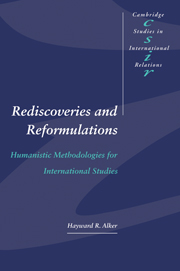Book contents
- Frontmatter
- Contents
- List of figures
- List of tables
- Acknowledgments
- Introduction: Voyages of rediscovery
- Part I Recovering Western antiquity
- Part II The humanistic science of the modern classics
- 4 The humanistic moment in International Studies: Reflections on Machiavelli and Las Casas
- 5 Can the end of power politics be part of the concepts with which its story is told? A Leibnizian reply
- 6 Rescuing “reason” from the “rationalists”: Reading Vico, Marx and Weber as reflective institutionalists
- 7 An Orwellian Lasswell: Humanistic scientist
- Part III Contemporary humanistic reformulations
- References
- Index
- CAMBRIDGE STUDIES IN INTERNATIONAL RELATIONS
5 - Can the end of power politics be part of the concepts with which its story is told? A Leibnizian reply
Published online by Cambridge University Press: 13 January 2010
- Frontmatter
- Contents
- List of figures
- List of tables
- Acknowledgments
- Introduction: Voyages of rediscovery
- Part I Recovering Western antiquity
- Part II The humanistic science of the modern classics
- 4 The humanistic moment in International Studies: Reflections on Machiavelli and Las Casas
- 5 Can the end of power politics be part of the concepts with which its story is told? A Leibnizian reply
- 6 Rescuing “reason” from the “rationalists”: Reading Vico, Marx and Weber as reflective institutionalists
- 7 An Orwellian Lasswell: Humanistic scientist
- Part III Contemporary humanistic reformulations
- References
- Index
- CAMBRIDGE STUDIES IN INTERNATIONAL RELATIONS
Summary
This chapter attempts to outline a methodology for committed peace research that dialectically synthesizes the virtues of positivist, radical (including Marxist) and more conservative (traditional) conflict resolution concerns. A necessary element in any such synthesis is the use of self-referential, strategy-suggesting, theory-imbedded, system-reflecting, narrative-oriented conceptualizations – as in my chapter title.
Both Bertell Oilman and Jon Elster have argued that Leibniz, Marx, Hegel and Whitehead adhered to an ontological philosophy that things are really “internal” relations. The first part of the chapter suggests an explication of this kind of “theory-laden” conceptualization in critical (primarily Marxist) perspectives on Absolutism; the second similarly reconstructs Leibniz's ironical labeling of Louis XIV as Mars Christianissimus. The third part outlines an “operational” conception of explanatory, interpretive and critical peace research. Its integrative vehicle, a recent artificial intelligence simulation of power plans by Roger Schank and Robert Abelson, illustrates how the critical, empirical application of descriptive concepts from either the Marxian or the Leibnizian tradition might be attempted.
The intellectual puzzle which this chapter addresses is elliptically summarized in its title: “Can the end of power politics be part of the [operational concepts] with which its story is told?” In the last decade or so, several such puzzles, some of them even more arresting, have come forcefully to my attention. Recalling them might better locate in the reader's mind the significance of such dialectical queries, and motivate the more abstract review of the philosophy of internal relations that these encounters provoked.
- Type
- Chapter
- Information
- Rediscoveries and ReformulationsHumanistic Methodologies for International Studies, pp. 184 - 206Publisher: Cambridge University PressPrint publication year: 1996

